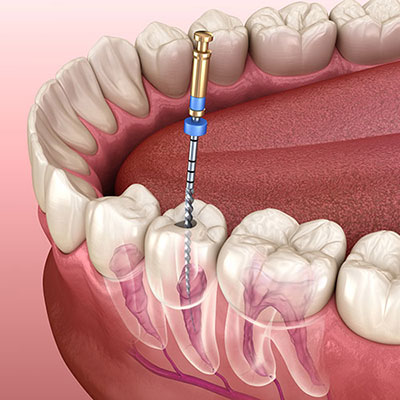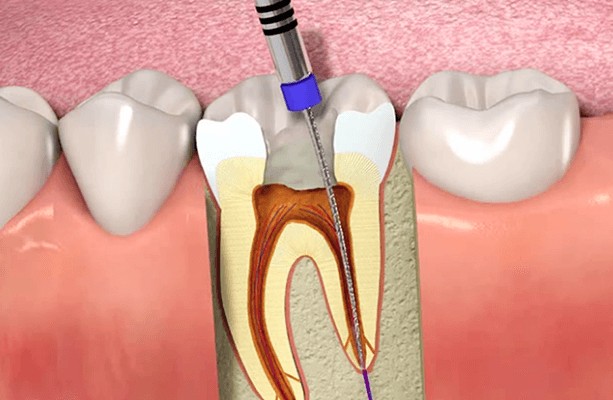A root canal is something you have all heard, but may not know exactly what it is. A root canal, or endodontic therapy, treats a tooth that may have become damaged or infected.
It may also be recommended if the tooth has become damaged or decayed severely so future problems can be avoided.
The rumor that root canals are painful has been put to rest with modern technology and techniques. Our offices located all over Washington and Oregon, including Redmond, Monroe, Seattle, Snohomish, Mill Creek, Everett, and more have perfected this procedure to be no more uncomfortable that a dental filling.
Why Would You Need A Root Canal?
Everyone is different, and there are many different reasons why you may need a root canal. Always remember that only your Sunrise Dentist can diagnose whether or not you may need a root canal. A well-known cause for needing a root canal can come from extensive tooth decay. Some symptoms include:
– Tooth and gum discomfort or pain
– Large cavities
– Extreme sensitivities to pressure and temperature
– Foul taste in your mouth
– Swollen lymph nodes around the infected tooth
What Happens During a Root Canal?
Before doing anything, your Sunrise Dentist will go over your x-rays to determine the best course of treatment. Normally, after the anesthetic, your dentist will protect the tooth with a dental dam. After you are completely numbed, your dentist will remove the infection from the tooth and other tissues through the root canal. This is the longest part of the root canal procedure, and while you will feel pressure it is painless.
Once your tooth is cleaned out, your tooth will be sealed, filled, and sometimes capped with a temporary crown until your permanent crowned can be placed at your next appointment.
How Can I Prevent Needing A Root Canal?
You can help prevent needing a root canal and other major dental work by keeping up with these small things for your oral health. Our locations all around Washington including Maple Valley, Puyallup, Auburn, Kent, and Issaquah have wonderful dentists that will help keep your oral health perfect.
Brush and floss at least twice per day. Schedule twice a year checkups for exams and cleanings. Wear protective mouth guards when playing sports to help prevent oral injuries

Please Call Us At +1 (855) 467-8674
- Tooth and gum discomfort or pain
- Large cavities
- Extreme sensitivities to pressure and temperature
- Foul taste in your mouth
- Swollen lymph nodes around the infected tooth
- Brush and floss at least twice per day
- Schedule twice a year checkups for exams and cleanings
- Wear protective mouth guards when playing sports to help prevent oral injuries
Root Canals
A root canal is something you have all heard, but may not know exactly what it is. A root canal, or endodontic therapy, treats a tooth that may have become damaged or infected. It may also be recommended if the tooth has become damaged or decayed severely so future problems can be avoided. The rumor that root canals are painful has been put to rest with modern technology and techniques.

What is a root canal treatment and how is it performed?
A root canal treatment saves an infected or damaged tooth by removing the nerve, cleaning the canals, and filling them to prevent reinfection. Aftercare includes good oral hygiene and check-ups.
What are the root canal procedures?
A root canal procedure involves:
- Diagnosis
- Local Anesthesia
- Isolation (Use of a Rubber Dam)
- Access Opening
- Pulp (Nerve) Removal
- Cleaning and Shaping (Eternally)
- Irrigation
- Filling Canals
- Sealing Access Opening
- Follow-Up Appointments
Are there risks or complications associated with root canal treatment?
Root canal treatments are safe, with rare risks like incomplete infection elimination, instrument fracture, perforation, incomplete sealing, postoperative discomfort, nerve damage, cracked tooth, and rare treatment failure. These risks are uncommon, and postoperative care and good oral hygiene help minimize them. Promptly informing the dentist of any unusual symptoms is advised.
Can a tooth with a crown or filling still need a root canal?
A tooth with a crown or filling may still need a root canal if there is decay beneath the restoration, cracks reaching the pulp, secondary decay around the restoration, trauma, or inflammation of the pulp. Regular dental check-ups are essential for early issue detection.
Best Dentists in Washington & Oregon
How long does a root canal procedure typically take?
A straightforward root canal procedure for a single tooth can take approximately 60 to 90 minutes. However, it is crucial to keep in mind that individual cases can vary, and the actual time may depend on factors like the tooth’s location, and complexity. Always consult with your dentist for a more precise estimate tailored to your specific situation.
Can a tooth with a previous root canal become infected again?
A previously root-canaled tooth can become re-infected due to numerous factors like incomplete removal of infected tissue, tooth complexity, cracks, recontamination, or weakened structure. Regular check-ups and good oral hygiene are crucial. If you suspect an issue, consult your dentist promptly.
What happens if I delay or avoid getting a root canal?
Delaying a root canal can lead to persistent pain, increased infection risk, potential tooth loss, systemic health issues, and more complex, costly treatment. Timely intervention is crucial for oral health. If recommended, proceeding with a root canal is advisable to prevent severe consequences.
How do I care for my tooth after a root canal to ensure proper healing?
After a root canal:
- Follow Dentist’s Instructions
- Manage Discomfort
- Be Gentle with Eating
- Maintain Oral Hygiene
- Attend Follow-Up Appointments
- Avoid Harmful Habits
- Watch for Signs of Infection
- Consider Permanent Restoration

